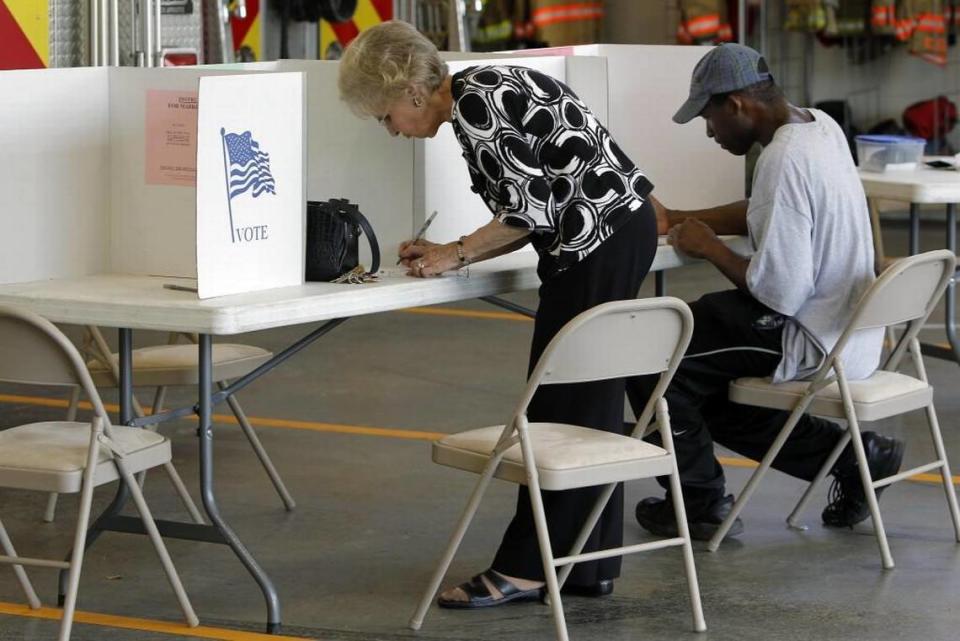NC lawmakers back some Johnston school election changes, but not all. Here’s what’s new.
State lawmakers are changing how — but not when — Johnston County school board members will be elected.
The General Assembly approved legislation on Tuesday that reorganizes Johnston County school board seats into residency districts, where candidates must live in their respective district. Candidates would still need to run countywide in the new district system. It would be used starting in the 2024 elections.
The Johnston County school board had passed a resolution Monday asking lawmakers to let them use residency districts and to move their elections to odd-numbered years. But the four members of the Johnston County legislative delegation said they weren’t ready to postpone the 2024 school board elections.
“Every member of the school board today appeared to indicate some support for residency boundaries, and we are willing to take an incremental step and implement those for the 2024 election and examine whether to move future elections to odd-numbered years during the short-session,” Sen. Benton Sawrey and Reps. Howard Penny, Terry Strickland and Donna White said in their joint statement.
“We also have concerns about extending the terms of the current members of the board for an additional year.”
Senate Bill 68 was unanimously passed in the Senate on Tuesday. It was approved 100-6 in the House. A final vote will happen Wednesday before it becomes law.
The bill includes a number of local changes and doesn’t require the approval of Gov. Roy Cooper.
Moving from at-large to residency districts
Currently, all seven school board seats are elected at-large with no district lines. The school board’s resolution said there’s no board members from the southern part of the county.
But under the legislation, all board seats would be placed in one of the seven new residency districts.
Voters would still pick all seven board seats in the new system. But supporters of the change say it will help provide representation to areas that don’t have a board member now.
It’s similar to how the Johnston County Board of Commissioners are elected.
“We all feel that Johnston County’s citizens deserve local representation,” according to the statement from the four Republican Johnston County lawmakers. “There are no current members of the Board residing in Benson, Cleveland, McGee’s Crossroads, Meadow, or Kenly.
“Our commissioner model works with respect to the residency boundaries and ensures that someone on the board lives in each part of the county.”
Johnston County is North Carolina’s seventh-largest school district. It has 37,000 students.
The legislation gives the school board until Nov. 17 to draw up the new lines for each district. If the board misses the deadline, school board elections would use the same lines that the county commissioners run on.
Four school board seats are on the 2024 ballot.
School board members had talked Monday about how they expected they’d have until October 2024 to draw up the new district lines. It was part of their request to move the non-partisan school board races on to the same ballot as non-partisan municipal races that are held in odd-numbered years.

‘Bring down the temperature’ of elections
Although officially non-partisan, Republicans hold the majority on the school board.
Board member Kevin Donovan said Monday that Marshall Conrad, chair of the Johnston County Republican Party, approached him about the change earlier this month at the Railroad Days Festival in Selma.
The idea quickly gained steam, with Monday’s school board vote being the first time the resolution was publicly discussed. Board members Michelle Antoine and Ronald Johnson had voted against the resolution because they said the process was rushed and being done without getting enough public input.
But Conrad said the legislation is a welcome change to how school board elections are held.
“We believe that this change will ensure that all areas of Johnston County have equal representation on the School Board and allow parents the opportunity to be closer to their elected member and therefore have more involvement in the education of their children,” Conrad said in a statement Tuesday.
“In addition, we believe this will help bring down the temperature of the School Board Election, so that the work of the Board can continue.”


